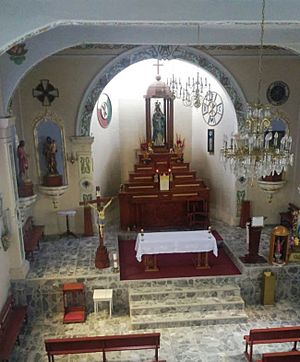Catholic Action facts for kids
Catholic Action is a special movement for Catholic people who are not priests or nuns. These groups work to help the Catholic Church have a bigger positive influence on society.
Catholic Action groups were very active in the 1800s in countries like Spain, Italy, and France. These places sometimes had governments that were against the Church's power.
Catholic Action is not a political party itself. However, these groups often got involved in political activities. After World War II, many of these ideas were taken up by Christian Democrat political parties. These parties worked to promote Catholic ideas about fairness and helping people in countries like Italy and West Germany.
Catholic Action usually has different groups for young people, women, and workers. Today, many worker groups from Catholic Action around the world are part of the World Movement of Christian Workers. This group still speaks up for working-class Catholics within the Church and in society.
Contents
History of Catholic Action
The Catholic Action movement started in the late 1800s. It began as a way to push back against growing feelings against the Church, especially in Europe.
Many different groups formed under the idea of Catholic Action. Some well-known ones include the Young Christian Workers, the Young Christian Students, the Cursillo movement, and the Legion of Mary.
Around 1912, a priest named Joseph Cardijn started a group for young seamstresses in Belgium. He wanted to help working-class people. In 1919, he founded the Young Trade Unionists. In 1924, this group became the "Jeunesse Ouvrière Chrétienne," known as the Young Christian Workers (JOC).
The JOC movement grew all over the world. Its members were often called "Jocists." By 1938, there were 500,000 members in Europe. By 1967, this number had grown to 2,000,000 members in 69 countries.
In 1934, Adolf Hitler ordered the killing of Erich Klausener. Klausener was a leader of a Catholic Action group in Nazi Germany. This happened during a violent event called the Night of the Long Knives.
Pope Paul VI praised those who were "fighting for Christ" in Catholic Action groups. He wrote about this in his first important letter, Ecclesiam suam. He connected their work to the important discussions happening inside and outside the Church, which he saw as part of the Second Vatican Council.
Catholic Action also led to the creation of international media groups. The International Catholic Union of the Press (UCIP) started in Belgium in 1927. A year later, the International Catholic Organization for Cinema (OCIC) began in the Netherlands. The International Catholic Bureau for Radio (BCIR) started in Germany. This radio group later became Unda in 1946.
These Catholic media professionals wanted to work together against society becoming less religious. They believed that newspapers, radio, and movies were making society less religious. But they also wanted to use these media tools to share Christian messages. They aimed to bring the values of the Gospel (teachings of Jesus) into the world of mass media.
In 2001, OCIC and Unda joined together to form a new organization called SIGNIS. In 2014, the Holy See (the Pope's main office) suggested that SIGNIS should also include members from the former UCIP.
Catholic Action in Australia
The National Civic Council is an Australian Catholic Action group. It was formed in 1957 by B.A. Santamaria. Before this, members of this group were active in the Australian Labor Party. However, they were removed from the party during a big split in 1955. The members who were removed then formed new political parties, including the Democratic Labor Party.
Catholic Action in Chile
In Chile, Catholic Action was a country-wide youth movement. Under the guidance of Saint Alberto Hurtado, this movement helped create the Chilean Trade Union Association. This group worked to support workers' rights.
Catholic Action in Italy
Azione Cattolica is one of the most active Catholic Action groups still around today. Catholic Action was very important in Italy. This was because it was hard for Catholic political parties to exist. First, there was a government from 1870 to about 1910 that was against the Church. Later, the Fascist government did not allow independent political parties.
The current Azione Cattolica group was founded in 1867. It was first called the "Italian Catholic Youth Society." It was later reorganized during the Mussolini government and became known as Azione Cattolica.
Catholic Action in Other Countries
Catholic Action groups were also organized in many other countries, including:
- Argentina (still active)
- Brazil
- Canada
- Croatia
- France
- Guatemala
- Ireland
- Italy
- Lithuania
- Malta
- Mexico
- New Zealand
- Poland
- Portugal
- Philippines
- Slovenia
- South Korea
- Spain (still active), where it helped start the Cursillo movement
- United Kingdom
- United States
See also
 In Spanish: Acción Católica para niños
In Spanish: Acción Católica para niños
- Catholic social teaching
- Corporatism
- Political catholicism
- Student Catholic Action
- Pascual Abaj
- Manuel Aparici Navarro
- Bartolome Blanco Marquez, a youth leader of Catholic Action who died during the Spanish Civil War


